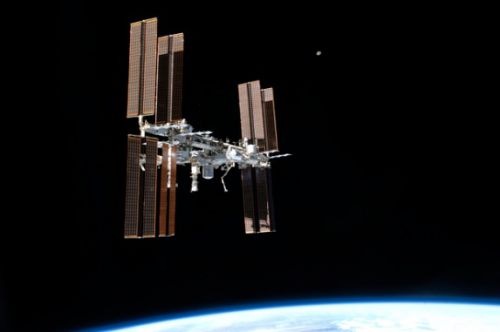ISSWill Shape Commercial Spaceflight
Gerstenmaier: ISS Will Shape Commercial Spaceflight
Credit: NASA
NASA’s top human spaceflight manager says the International Space Station holds the key to a shift from government to commercial access to low Earth orbit, driving the nascent market for new human-rated vehicles as researchers find industrial uses for its microgravity environment.
Speaking to the annual FAA Commercial Space Transportation Conference, William Gerstenmaier, associate administrator for human exploration and operations, said the station already provides a significant launch market that can only grow as the orbiting lab is better utilized.
In 2012 the ISS was the destination of 15% of the total number of space launches worldwide. If the field is narrowed to the 17 comparable launches of spacecraft to low or geostationary transfer orbits, the 12 flights to the station represent a major new source of revenue, he said. And it is a new type of market, in that launch vehicle reliability for cargo isn’t as crucial as for expensive satellites.
“Station allows us a different way of doing business, where I could tolerate an individual failure,” he said. “I can’t tolerate the failure of an entire launch system, or an extended down period of time, but I can tolerate loss of an individual flight.”
Most of the transportation to and from the station currently meets government needs for research in basic science, applied science for human exploration of space, and applied science to benefit life and industry on Earth. But the real test of the ISS will be in how widely industry adopts it as an environment for its own research.
“Station is driving this market, but I think station has the potential to drive a fair amount of privately funded launches, separate from the U.S. government, and that could be the real benefit of space station,” Gerstenmaier said.
NASA has hired a nonprofit startup created by the state of Florida — the Center for the Advancement of Science in Space (Casis) — to market the station’s facilities to industry and to find and distribute funding for research there. The effort will be crucial to the station’s ultimate success, Gerstenmaier said.
“If we just stay with the government-funded research, I don’t think that’s sustainable in the long term,” he said. “At some point we need to show that there’s a market advantage, there’s a reason that commercial companies want to be in space, independent of the government.”
With U.S. ISS funding set to expire in 2020, there is a “finite window” to take advantage of the $100 billion asset. “We need to use station as a way to show that space-based research is a really important tool for industry,” Gerstenmaier said.
A découvrir aussi
- planete MARS - CANARD
- la belle et mystérieuse météorite de Fukang
- "Si vous voyez une lumière très brillante dans le ciel .......

